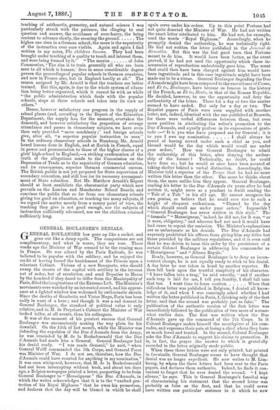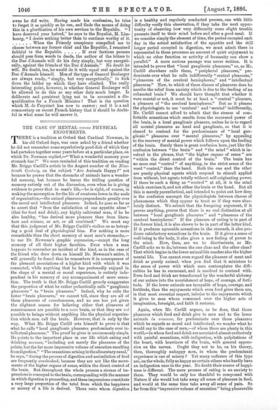GENERAL BOULANGER'S DENIALS.
GENERAL BOULANGER has gone up like a rocket, and gone out like a damp squib. The comparisons are not complimentary, and what is worse, they are true. Three weeks ago the Minister of War seemed to be the coming man in France. He was adored by the Paris Radicals, he was believed to be popular with the soldiery, and he enjoyed the credit of having forced the banishment of the Princes upon a reluctant Cabinet. Visions of a new Bonaparte, who should sweep the streets of the capital with artillery in the interest not of order, but of revolution, and send Deputies to Mazas by the hundred if they dared to differ from the Municipality of Paris, filled the imaginations of the Extreme Left. The Minister's movements were watched by an interested crowd, and his appear- ance at a lighted window was welcomed by enthusiastic shouts. Since the deaths of Gambetta and Victor Hugo, Paris has been sadly in want of a hero ; and though it was a sad descent to General Boulanger, the standard of political value is only relative, and in M. de Freycinet's Cabinet the Minister of War looked taller, at all events, than his colleagues. It was at the moment of his greatest success that General Boulanger was unconsciously making the way plain for his downfall. On the 13th of last month, while the Minister was defending the expulsion of the Duo d'Aumale from the Army, he was reminded by M. de la Rochefoucauld that the Due d'Aumale had made him a General. General Boulanger had his denial ready. "I was made General," he said, "when General Wolff commanded the 7th Corps, and General Farre was Minister of War. I do not see, therefore, how the Due d'Aumale could have counted for anything in my nomination." It was soon whispered, however, that M. de la Rochefoucauld had not been interrupting without book, and about ten days ago, a Belgian newspaper printed a letter, purporting to be from General Boulanger to " Monseigneur " the Duo d'Aumale, in which the writer acknowledges that it is to the "exalted pro- tection of his Royal Highness" that he owes his promotion, and declares that the day will be blessed in which he shall again serve under his orders. Up to this point Fortune had not quite deserted the Minister of War. He had not written the exact letter attributed to him. He had not, for example, used the words "Royal Highness." Accordingly, when he promptly denied the authorship, he was technically right. He had not written the letter published in the Journal de Bruxelles. But this was the last good turn that Fortune meant to do him. It would have been better, as the event proved, if he had not used the opportunity which these in- accuracies of reproduction undoubtedly gave him. The worst that could then have been charged against him would have been ingratitude, and in this case ingratitude might have been made out to be a virtue. General Boulanger degrading the Due d'Aumale might have been compared to the executioner of Caasar, and Et tu, Boulanger, have become as famous in the history of the French, as Et tu, Brute, in that of the Roman Republic. He decided, however, to use the opportunity and deny the authenticity of the letter. There for a day or two the matter seemed to have ended. But only for a day or two. The Royalist papers of Paris were soon supplied with another letter, not, indeed, identical with the one published at Brussels, for there were verbal differences between them, but even more positive in attributing the writer's promotion to the Duo d'Aumale, and equally profuse in its expressions of grati- tude :—" It is you who have proposed me for General ; it is to you I owe my nomination I shall always be proud of having served under such a chief as you, and blessed would be the day which would recall me under your orders." How was General Boulanger to admit the authorship of this letter, after denying the author- ship of the former? Technically, no doubt, he could have done so ; but he would at once have been accused of taking shelter behind a verbal distinction. Accordingly, the Minister told a reporter of the Temps that he had no more written this letter than the other. The more he thinks about them, the more unlike him they appear. General Boulanger, reading his letter to the Due d'Aumale six years after be had written it, might serve as a pendant to Swift reading the "Tale of a Tub" in his oil age. He cannot recognise his own genius, or believe that he could ever rise to such a height of eloquent enthusiasm. "Blessed be the day which should recall me under your orders." Impossible 1 "General Boulanger has never written in this style." The " formula " " Monseigneur," indeed, he did use, for it was, "as it were, obligatory," and whoever had not used it would have had cause to repent the omission. The Minister's explanations are as unfortunate as his denials. The Due d'Aumale had expressly prohibited his officers from giving him any titles but those provided by the military regulations, and it is even said that he was driven to issue this order by the persistence of a certain Colonel Boulanger in addressing his commander as " Monseigneur " and 44 Altesse Royale."
Ready, however, as General Boulanger is to deny an incon- venient charge, he is not equally ready to stick to his denial. A day later he was taken in hand by another reporter. He then fell back upon the trustful simplicity of his character. "I have fallen into a trap," he said sweetly, "and if another such trap is laid for me, I tell you frankly, I shall fall into that too. I want time to learn caution When that ridiculous letter was published in Belgium, I denied all know- ledge of it, and when I was cunningly asked whether I had written the letter published in Paris, I, thinking only of the first letter, said that the second was probably just as false." The publication of the authentic version of the first letter was immediately followed by the publication of two more of a some- what earlier date. The first was written when the Due d'Aumale gave up the command of the 7th Corps. In it Colonel Boulanger makes himself the mouthpiece of his com- rades, and expresses their pain at losing a chief whom they have so much loved and trusted. In the second, Colonel Boulanger asks the Duo d'Aumale to support his claims to promotion. It is, in fact, the prayer the answer to which is gratefully recorded in the letter originally made public.
When these three letters were not only printed, but printed in fac-simile, General Boulanger seems to have thought that denial was no longer expedient. He now writes to M. Lim- bourg, by whom the three letters had been sent to the Paris papers, and declares them authentic. Indeed, he finds it con- venient to forget that he ever denied the second. " I kept silence," he says. This is General Boulanger's fanciful way of characterising his statement that the second letter was probably as false as the first, and that he could never have written one particular sentence in it which he now
owns he did write. Having made his confession, he tries to forget it as quickly as he can, and finds the means of doing this in a glorification of his own services to the Republic. "I have deserved your hatred," he says to the Royalist, M. Lim- bourg, "I desire nothing better than to continue worthy of it. When the Princely conspiracy compelled me to choose between my former chief and the Republic, I remained faithful to the Republic. If ever factious persons should pass from words to deeds, the author of the letters to the Duo d'Aumale will do his duty simply, but very energeti- cally, against the friends of the Due d'Aumale." No doubt he will. No doubt, too, he would do it with equal zeal against the Duo d'Aumale himself. Men of the type of General Boulanger are always ready," simply, but very energetically," to kick down the ladder up which they have climbed. The really interesting point, however, is whether General Boulanger will be allowed to do this or any other duty much longer. Is deliberate and persistent lying not to be accounted a dis- qualification for a French Minister ? That is the question which M. de Freycinet has now to answer ; and it is a sad commentary on recent French history that it should be doubt- ful in what sense he will answer it.



































 Previous page
Previous page